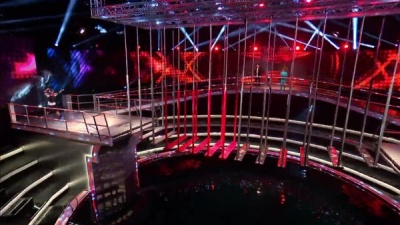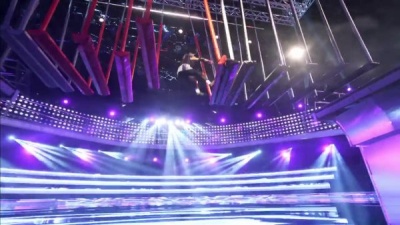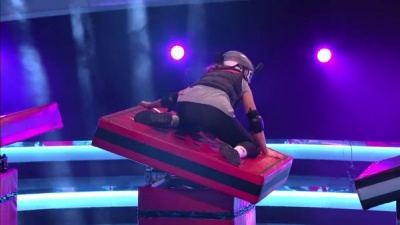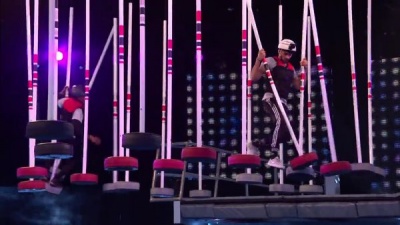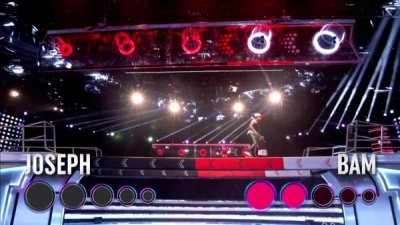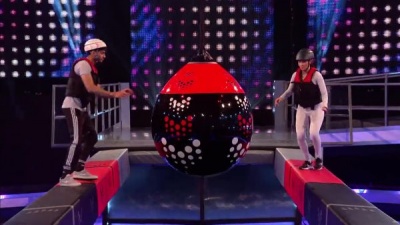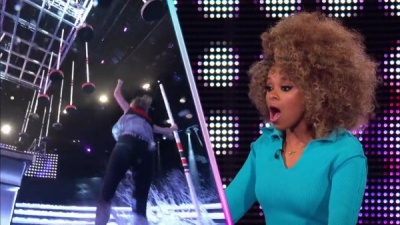The Void
(Shove end paragraph into past tense, and -- Cat:Current.) |
(→Synopsis: ft) |
||
| Line 84: | Line 84: | ||
Ashley Banjo and Fleur East are the hosts, and perhaps we don't need both of these people ''and'' the commentator. Either Ashley or Fleur could host the show on their own. | Ashley Banjo and Fleur East are the hosts, and perhaps we don't need both of these people ''and'' the commentator. Either Ashley or Fleur could host the show on their own. | ||
| - | At best, the first series of ''The Void'' felt like a work in progress. It had a spark, something that could turn into a hit - just as [[Gladiators]] clicked in its second series, back in the day. But ''The Void'' wasn't appointment viewing, just something to watch while there's nothing better on. And in these days of a zillion channels and streaming, that proved not be enough; the show was not picked up for a second series. | + | At best, the first series of ''The Void'' felt like a work in progress. It had a spark, something that could turn into a hit - just as [[Gladiators]] clicked in its second series, back in the day. But ''The Void'' wasn't appointment viewing, just something to watch while there's nothing better on. And in these days of a zillion channels and streaming, that proved not to be enough; the show was not picked up for a second series. |
== See also == | == See also == | ||
Revision as of 19:07, 24 October 2021
Contents |
Host
Ashley Banjo and Fleur East
Co-host
Commentator: Nick Heath
Broadcast
Gameface Productions for ITV, 10 July to 28 August 2021 (8 episodes in 1 series)
Synopsis
The one where people try to cross a massive expanse of water without falling in.
For the first round, "Bridge the Gap", fifteen contenders set off and hope to stay dry. Most will get wet. They try to cross an uneven series of planks spanning the gorge. The planks are suspended on poles, and will swing under the contestant's weight. The five who make least progress across the bridge will be eliminated (ties broken by time, if needed).
It's a swift challenge, most people will either cross or fall in within a few seconds. We get some brief clips of the contestants in their usual life, and some clips of the contestants swimming out of the void after they've fallen in. Nick Heath does the commentary throughout, his witty and acerbic remarks are a highlight of the show.
Ten remain to take on the next challenge. Some weeks, they play "Revolution Road", make a way across various revolving platforms: a spinning turntable, a peaked thing, a hoop to pass through, some crosshairs, and a tilting turntable. All of them spin in the opposite direction to the last. Again, whoever gets furthest progresses, and only two players leave.
Other weeks, the "Leap of Faith". Blindfolded, they are to go from tilting platform to tilting platform. These platforms don't revolve, but they do get smaller as they go on. And they tilt. And, with the contestants being blindfolded, they can't see what they're doing, and must feel where the edge of each platform is.
The remaining eight are drawn into four head-to-head competitions. "Memory Lane" involves a forest of poles, arranged into two rows for each player. Some of the poles are duds, and will snap away under a contender's full weight (but not on a gentle tug. Sneaky!) The objective is to get further than your opponent, either by crossing all the way faster, or getting past the point where they fell in.
The winners go into the semi-final. Some weeks, it's "Target Dash". Throw a ball into each of five targets. Each target gets smaller as you go, and you can only carry one ball at a time. First contestant to throw a ball into all five targets wins, and their opponent is tilted into the water. Other weeks, they play with "Fire balls": collect all seven as they're fired at you to end your opponent's game.
Every week, the winners face the "Wrecking Ball", where the two survivors try to fling a giant ball at each other until one of them falls off. Hit by the ball? Overbalanced while pushing it? Doesn't matter, a fall is a fall, a loss is a loss.
The winner goes on to face "Splashdown", where the winner tries to earn some gold coins of their own. A course is marked, in the show's colour palette of white, red, black. The course could be cargo nets, it could be big balls, it could be tyres hanging from the roof. Whatever it is, the aim is to follow the course from one bank to the other.
But there's added jeopardy: the course will literally fall into the void as time goes on. The nets, the balls, the tyres will all fall to the water. There's a £1000 prize if the contender makes it to the red zone before they fall down; it shoots up to £10,000 if they make the black section. Reach the end of the course in time and there's a well-earned £25,000 prize.
A lot of the little details were done well. The coherent visual design: every journey goes from the white section, into the red section, into the black section. There are arrows, always pointing in the direction of travel. Replays and editing give the show a great look, up with the fashions.
Viewer reaction was mixed. The Void was the number one ITV programme amongst children under 16, even beating Love Island. But older viewers were critical. "Repetitive" and "dull" and "repetitive" and "boring" and "repetitive", the most common words. And we get where they're coming from: The Void has one prop (the huge tank of water) and is going to make the most out of it. Like Ice Warriors a generation earlier, there isn't much one can do with a huge tank of water, other than get wet.
Ashley Banjo and Fleur East are the hosts, and perhaps we don't need both of these people and the commentator. Either Ashley or Fleur could host the show on their own.
At best, the first series of The Void felt like a work in progress. It had a spark, something that could turn into a hit - just as Gladiators clicked in its second series, back in the day. But The Void wasn't appointment viewing, just something to watch while there's nothing better on. And in these days of a zillion channels and streaming, that proved not to be enough; the show was not picked up for a second series.


